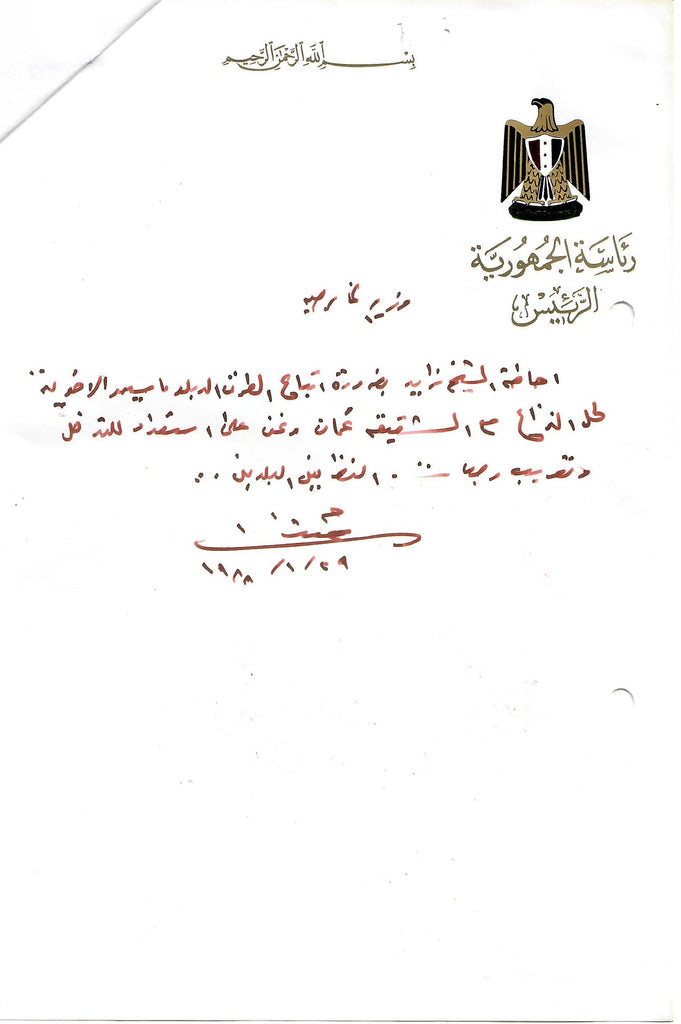Item Description
Original Item: One-Of-A-Kind. This is an extremely interesting piece of history from the Iraq Iran War! This handwritten letter was written on December 13, 1988 and sent to the Minister of Foreign Affairs for King Fahd bin Abdul Aziz Al-Saud, on matters concerning economic support and for him to stand by Iraq.
During the war between Iran and Iraq (1980–88), Saudi Arabia provided financial support to Iraq but did not involve its army in the dispute.
He writes about wanting the King to be briefed on all documents and matters concerning the Gulf countries and how they were practicing various methods of economic warfare on Iraq and was not requesting help from Saudi Arabia.
This is a rough translation and it is hard to read the script in which the Arabic was written. We are not professional translators, but we will include an English transcript of the letter for the translation we received.
This is a wonderful piece of history and the letter even has traces of fingerprints on it! Comes ready to translate and display.
Saddam Hussein
Saddam Hussein Abd al-Majid al-Tikriti was an Iraqi politician who served as the fifth president of Iraq from 16 July 1979 until 9 April 2003. A leading member of the revolutionary Arab Socialist Ba'ath Party, and later, the Baghdad-based Ba'ath Party and its regional organization, the Iraqi Ba'ath Party—which espoused Ba'athism, a mix of Arab nationalism and Arab socialism—Saddam played a key role in the 1968 coup (later referred to as the 17 July Revolution) that brought the party to power in Iraq.
As vice president under the ailing General Ahmed Hassan al-Bakr, and at a time when many groups were considered capable of overthrowing the government, Saddam created security forces through which he tightly controlled conflicts between the government and the armed forces. In the early 1970s, Saddam nationalized the Iraq Petroleum Company and independent banks, eventually leaving the banking system insolvent due to inflation and bad loans. Through the 1970s, Saddam consolidated his authority over the apparatus of government as oil money helped Iraq's economy grow rapidly. Positions of power in the country were mostly filled with Sunni Arabs, a minority that made up only a fifth of the population.
Saddam formally took power in 1979, although he had already been the de facto head of Iraq for several years. He suppressed several movements, particularly Shi'a and Kurdish movements which sought to overthrow the government or gain independence, respectively, and maintained power during the Iran–Iraq War and the Gulf War. Saddam's rule was a repressive dictatorship notorious for its severe human rights abuses. The total number of Iraqis killed by the security services of Saddam's government in various purges and genocides is conservatively estimated to be 250,000. Saddam's invasions of Iran and Kuwait also resulted in hundreds of thousands of deaths.
In 2003, a coalition led by the United States invaded Iraq to depose Saddam. U.S. President George W. Bush and British Prime Minister Tony Blair accused Iraq of possessing weapons of mass destruction and having ties to Al-Qaeda. Saddam's Ba'ath party was disbanded and the country's first democratic elections were held. After his capture on 13 December 2003, the trial of Saddam Hussein took place under the Iraqi Interim Government. On 5 November 2006, Saddam was convicted by an Iraqi court of crimes against humanity related to the 1982 killing of 148 Iraqi Shi'a and sentenced to death by hanging. He was executed on 30 December 2006.
- This product is available for international shipping.
- Not eligible for payment with Paypal or Amazon




